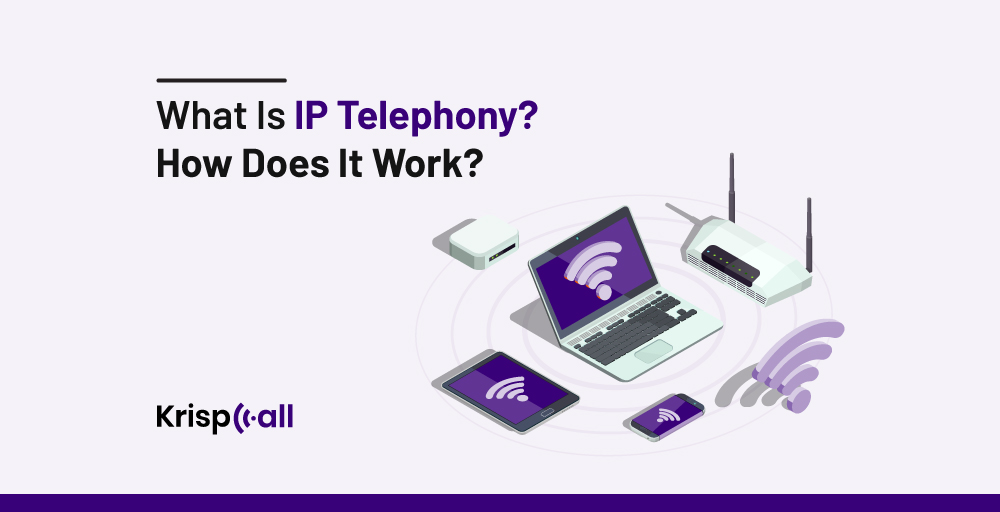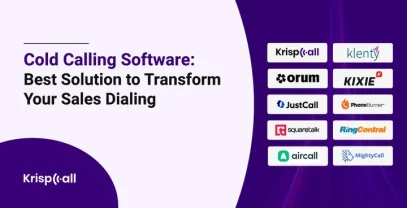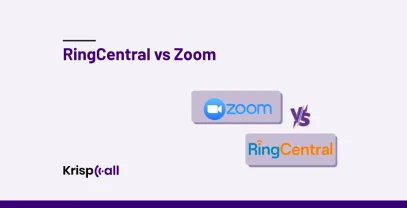For decades, traditional landline phones have been used to make calls. However, the medium for making calls is changing, and the key factor for this change is the introduction of Internet Protocol (IP) telephony.
So, are you wondering what IP telephony is and how it works? If yes, then this article is for you.
In this blog, we’ll discuss IP telephony, how it works, its benefits, and how it could help your business transition into the digital age.
🔑Key Highlights
- IP telephony is a technology that helps people communicate through the internet.
- IP phone systems work by sending data packets through the internet in order to facilitate communication.
- VoIP is a subset of IP telephony systems.
- IP phone systems are a very cost-effective option in comparison to traditional landline systems.
What is IP Telephony?
IP telephony is a technology that allows us to send and receive voice communication data and multimedia sessions over the Internet rather than traditional telephone networks.
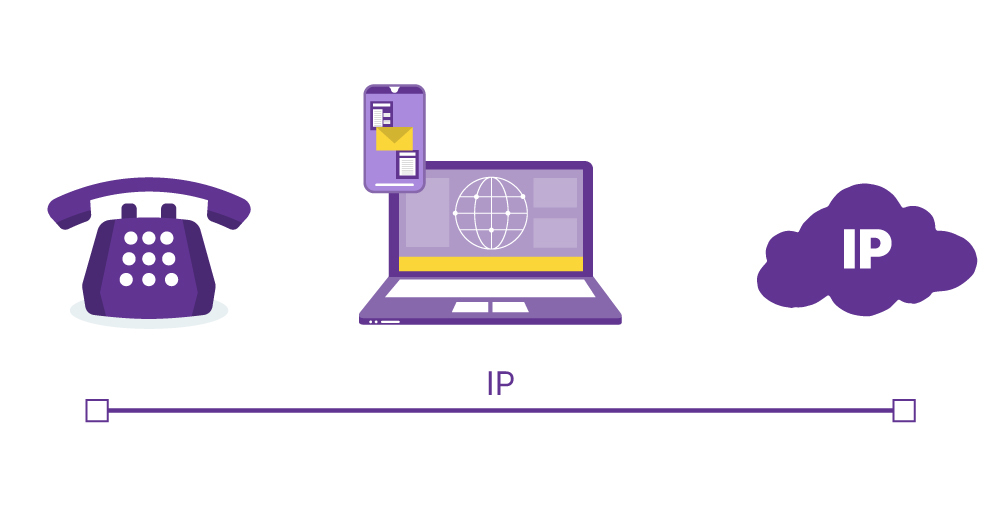
Unlike traditional landlines, which transmit analog signals, IP phones transport voice signals to data packets and transmit them via the Internet. IP phones can help with unified communications and are also used for video calling, text messaging, faxing, and other forms of communication over the Internet and much more at a much lower cost.
How Does IP Telephony Work?
IP telephone works by scanning analog voice signals and changing them into digital signals. These digital signals are broken into smaller data packets, which travel through the Internet like other data traffic to its destination.
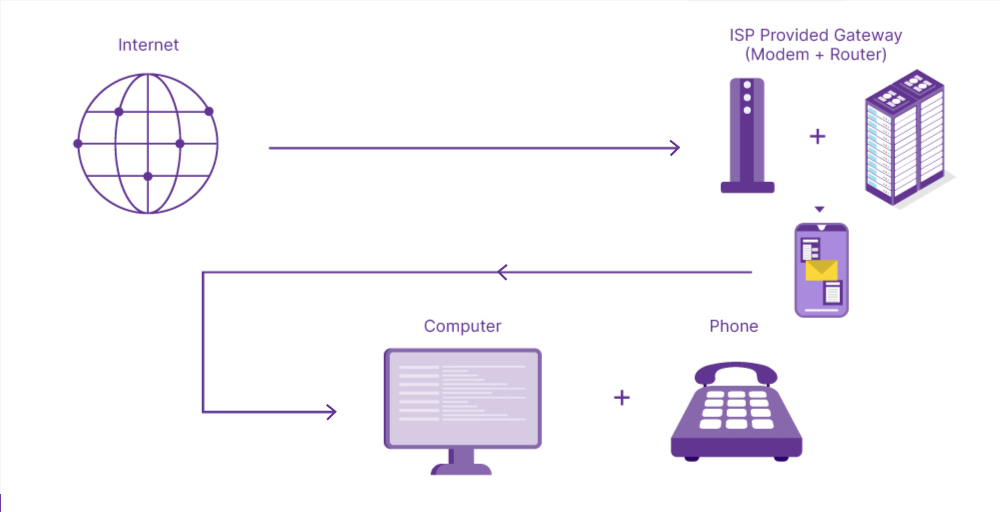
Different protocols help these data packets reach their destination. They help build a connection between send and receiver for data transmission. These data packets are assembled at the receiver’s end and converted to analog signals.
Want to learn more? Read this 👉 What is VoIP Phone? How does it work?
IP Telephony Vs. VoIP: What Is The Difference?
IP is a much bigger term than VoIP. Although they have some similarities and the same functionality, they also have some differences.
IP telephony encompasses all phone services that use IP networks, including VoIP calls. It includes voice and video calls, online faxes, and messages. It also includes VoIP systems and upgraded traditional landline systems that use IP.
VoIP means transmitting voice calls digitally over a network that uses the internet protocol (IP). It is a subset of IP telephony. Therefore, all VoIP systems fall under the IP telephony system but not vice versa.
Take a closer look at the differences: 👉What Is IP Telephony? How Is It Different From VoIP
IP Telephony Features
IP telephony helps businesses grow efficiently by providing many functionalities. For that capability, IP phone systems come with some useful features of IP telephony that are particularly valuable for users:
- Call Forwarding: Call forwarding is one of the most common features that IP telephony systems have. This feature allows users to redirect incoming calls to another number, such as a mobile phone or another extension, ensuring calls are never missed, even when away from the desk.
- Caller ID: Caller ID is a fundamental feature that displays the incoming caller’s phone number on the recipient’s device before they answer the call. It helps users identify important calls from known contacts while also providing the option to ignore or redirect calls from unknown or unwanted numbers.
- Voicemail: Like most phone systems, IP telephony phone systems also have a voicemail option. Voicemail enables callers to leave messages when the person they want to contact is unavailable or unable to answer the call.
- Three-way Calling: Generally offered by IP systems, Three-way calling is a feature that enables users to add a third party to an ongoing phone conversation. With it, users can facilitate small group discussions and collaboration without having to use a separate service.
- Call Blocking: Call blocking is a feature that blocks unwanted or spam calls from any number. It is also known as call rejection, call block, and call screening. Most IP phone systems have these, and users can block unwanted calls from their contact lists.
- IVR: An IVR is an automated call routing system that enables users to navigate the phone menu by responding to voice messages using keypad inputs. It often has several layers of interaction for the users by giving them choices or actions that lead them to an agent, queue, information, or action as needed.
Key Components Of IP Telephony System
IP telephony has several essential components. Each has a specific function to transmit voice communication over IP networks. Here are some essential components:
- IP PBX: The IP PBX (Private Branch Exchange) is the central hub and control unit for all the features of the IP telephony system. It allows access to all the functionalities of IP phones.
- Softphones: Softphones are software-based phone systems installed on computers or mobile phones. They help users effectively make and receive calls through these devices.
- VoIP Gateways: VoIP gateways help transform traditional landline systems by upgrading them to IP-based communication. They connect IP telephony to the PSTN (Publicly Switched Telephone Network).
- Session Border Controllers (SBCs): SBCs work as gatekeepers, allowing only authorized users into the network. They control IP telephony traffic and provide security to all users by denying unauthorized access.
Benefits Of IP Telephony
IP telephony uses the internet to make calls and has many functionalities. This automatically makes it more beneficial than traditional analog phones. Here is how it benefits the users.
Reduced Costs
IP telephony services are much cheaper than traditional landline systems. They can reduce your business’s phone bills by half compared to traditional telephone systems. Additionally, they are even more cost-effective for making long-distance and international calls.
More Features Without Extra Hardware
IP telephony solutions offer advanced features such as call routing, instant messaging, call recording, number sharing, video conferencing, and more. The best part about these systems is that they can also be upgraded with different add-ons, CRM integrations, and additive features without investing in extra resources like hardware or software.
Increased Accessibility
IP telephony services can be used from anywhere through any capable device via the Internet. You can use your computer or mobile phone to make and receive calls. The softphone feature also increases accessibility, which benefits remote users or users who travel a lot.
Unified Communication
Many IP systems also have the capability to support UC options, meaning various communication channels like voice calls, video conferencing, instant messaging, and faxing can be integrated and used in a single platform. This makes communication much easier for businesses.
Disadvantages Of IP Telephony
While IP telephony has many advantages, it has fewer disadvantages, which can be tackled easily. The following shows these disadvantages:
- Internet Dependency: Unlike traditional phones, IP telephony service is on the Internet. So, when the internet is unavailable, IP telephony services become useless.
- Dealing with Jitter: Sometimes, when you’re on a call, the data packets representing your conversation can bounce around. This can mess up the sound quality and make your call experience less enjoyable.
- Security concerns: Like any internet-based technology, VoIP systems can be vulnerable to security threats like hacking and eavesdropping. So, it’s important to choose a reputable VoIP provider with strong security measures in place.
Challenges With IP Telephony
Switching from a traditional phone to an IP telephony system has many benefits. However, on the flip side, transitioning to it also has some challenges.
These challenges are listed below:
- QoS (Quality of service): IP telephony depends on the internet, so when the connection is down, it may cause issues like delay, jitter, and packet loss when using these services. As a result, insufficient bandwidth can lead to poor voice quality or dropped calls, leading to fluctuating QoS.
- Security: IP telephony converts voice into data packets. These data packets travel through networks and can be intercepted and decoded without proper encryption. DoS attacks can also overwhelm IP networks, causing the service to be unavailable and posing a tough challenge to deal with.
- Compatibility: Not every device is made to be used with IP systems, especially the old ones. Compatibility issues can also arise because some devices, like old routers or softphone services, do not support all VoIP protocols, including SIP and H.323.
- Reliability: Your IP telephony service uses an Internet connection rather than a traditional phone line. This means that when the Internet is down the service is down and it can cause issues with your connectivity.
👀Take a Look at: 5 Reasons to upgrade your office landline phone into VoIP business phone.
IP Telephony Protocols
IP telephony Protocol uses various protocols to facilitate communication between devices and ensure that voice data is transmitted. Here are some key protocols used in IP telephony:
- Session Initiation Protocol (SIP): SIP protocols are responsible for initiating, managing, and terminating VoIP calls. SIP protocols are also responsible for functions such as call session management and signaling.
- H.323: H.323 is an ITU standard for multimedia communication over IP networks. It is similar to SIP but is less flexible. H.323 encompasses a suite of protocols and is used for real-time voice, video, and data communication.
- Real-time Transport Protocol (RTP): RTP is the protocol that is responsible for breaking down your voice into small digital packets. It’s the backbone for transmitting the actual voice data between participants.
- Real-time Control Protocol (RTCP): RTCP is a companion protocol to RTP that is responsible for monitoring the quality of your call. The distinctive feature of this is that it sends feedback messages within the systen about things like packet loss or jitter (delays in transmission).
- Session Description Protocol (SDP): SDP protocol is mainly used to set up video conferences and phone calls online. It acts like a guide describing the media capabilities of each endpoint involved in the communication and plays a supporting role in call setup.
💡Also Read: SIP vs. VoIP: What are the differences & which one is the best?
Discover Efficiency with VoIP: Reduce Costs and Enhance Capability
With VoIP, you can change your traditional way of carrying out conversations. VoIP helps you have conversations over the Internet for a fraction of the cost of conventional landlines. It also helps to minimize your spending by cutting your phone bill.
VoIP also allows you to communicate using your computer or smartphone, which helps you be flexible. You can work from anywhere and make video conferences or voice calls. Also, protect your conversation from others who are trying to eavesdrop.
And when considering VoIP services, you’ve got phone systems like KrispCall. With KrispCall, you can make global calls and send SMS and voicemails instantly. You can also use multiple numbers for personal and business purposes. You can check your call history and monitor live calls.
It also has additional features like bulk SMS and call barging, all of which you can start making use of by singing up to KrispCall and acquiring a subscription plan that starts at just $15 per month.
Conclusion
IP telephony is a medium for connecting to another individual using an internet connection. It uses different protocols to send data in the form of data packets, which are assembled at the destination. The information is then received.
IP telephony greatly benefits businesses by reducing costs, building unified communication, and increasing accessibility. It also uses protocols like SIP, RTP, SRTP, etc., which help to build and protect a connection between two individuals.
Furthermore, if you are looking to upgrade your phone system to a better one, you can just switch to KrispCall. With KrispCall, you get all the features and privileges that you could wish for and benefit from to the fullest extent possible while upgrading your telephony.

